Launching the #CPUOverload Project: Testing Every x86 Desktop Processor since 2010
by Dr. Ian Cutress on July 20, 2020 1:30 PM ESTCPU Tests: Legacy and Web
In order to gather data to compare with older benchmarks, we are still keeping a number of tests under our ‘legacy’ section. This includes all the former major versions of CineBench (R15, R11.5, R10) as well as x264 HD 3.0 and the first very naïve version of 3DPM v2.1. We won’t be transferring the data over from the old testing into Bench, otherwise it would be populated with 200 CPUs with only one data point, so it will fill up as we test more CPUs like the others.
The other section here is our web tests.
Web Tests: Kraken, Octane, and Speedometer
Benchmarking using web tools is always a bit difficult. Browsers change almost daily, and the way the web is used changes even quicker. While there is some scope for advanced computational based benchmarks, most users care about responsiveness, which requires a strong back-end to work quickly to provide on the front-end. The benchmarks we chose for our web tests are essentially industry standards – at least once upon a time.
It should be noted that for each test, the browser is closed and re-opened a new with a fresh cache. We use a fixed Chromium version for our tests with the update capabilities removed to ensure consistency.
Mozilla Kraken 1.1
Kraken is a 2010 benchmark from Mozilla and does a series of JavaScript tests. These tests are a little more involved than previous tests, looking at artificial intelligence, audio manipulation, image manipulation, json parsing, and cryptographic functions. The benchmark starts with an initial download of data for the audio and imaging, and then runs through 10 times giving a timed result.
Automation involves loading the direct webpage where the test is run and putting it through. All CPUs finish the test in under a couple of minutes, so we put that as the end point and copy the page contents into the clipboard before parsing the result. Each run of the test on most CPUs takes from half-a-second to a few seconds
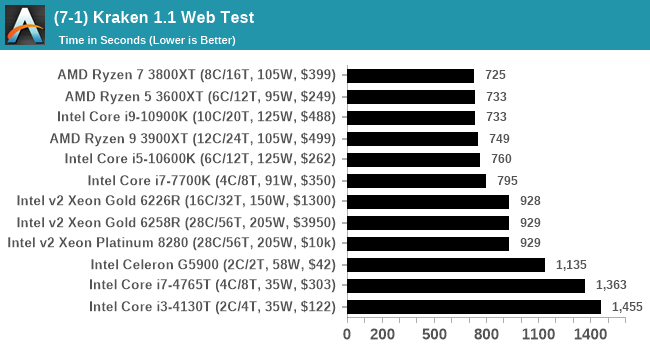
We loop through the 10-run test four times (so that’s a total of 40 runs), and average the four end-results. The result is given as time to complete the test, and we’re reaching a slow asymptotic limit with regards the highest IPC processors.
Google Octane 2.0
Our second test is also JavaScript based, but uses a lot more variation of newer JS techniques, such as object-oriented programming, kernel simulation, object creation/destruction, garbage collection, array manipulations, compiler latency and code execution.
Octane was developed after the discontinuation of other tests, with the goal of being more web-like than previous tests. It has been a popular benchmark, making it an obvious target for optimizations in the JavaScript engines. Ultimately it was retired in early 2017 due to this, although it is still widely used as a tool to determine general CPU performance in a number of web tasks.
Octane’s automation is a little different than the others: there is no direct website to go to in order to run the benchmark. The benchmark page is opened, but the user has to navigate to the ‘start’ button or open the console and initiate the JavaScript required to run the test. The test also does not show an obvious end-point, but luckily does try and aim for a fixed time for each processor. This is similar to some of our other tests, that loop around a fixed time before ending. Unfortunately this doesn’t work if the first loop goes beyond that fixed time, as the loop still has to finish. For Octane, we have set it to 75 seconds per run, and we loop the whole test four times.
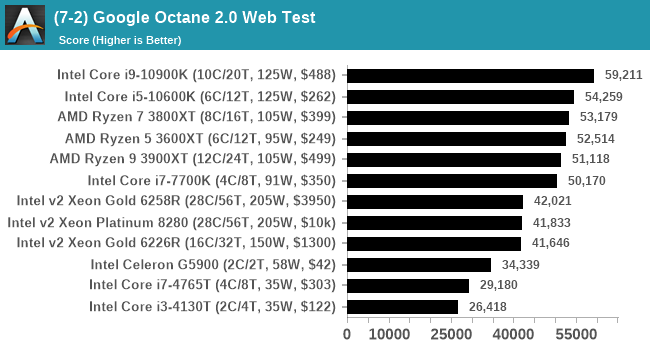
It is worth noting that in the last couple of Intel generations, there was a significant uptick in performance for Intel, likely due to one of the optimizations from the code base that filtered through into the microarchitecture. Octane is still an interesting comparison point for systems within a similar microarchitecture scope.
Speedometer 2: JavaScript Frameworks
Our newest web test is Speedometer 2, which is a test over a series of JavaScript frameworks to do three simple things: built a list, enable each item in the list, and remove the list. All the frameworks implement the same visual cues, but obviously apply them from different coding angles.
Our test goes through the list of frameworks, and produces a final score indicative of ‘rpm’, one of the benchmarks internal metrics. Rather than use the main interface, we go to the admin interface through the about page and manage the results there. It involves saving the webpage when the test is complete and parsing the final result.
We repeat over the benchmark for a dozen loops, taking the average of the last five.
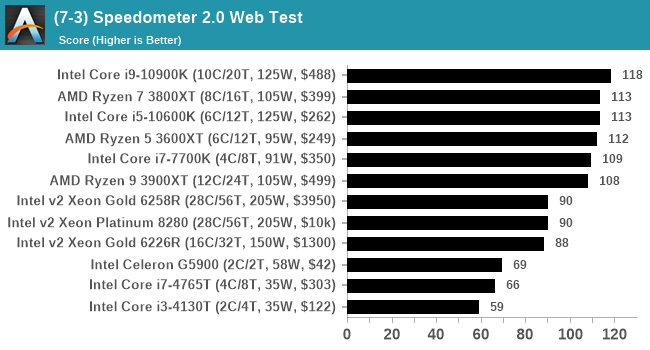


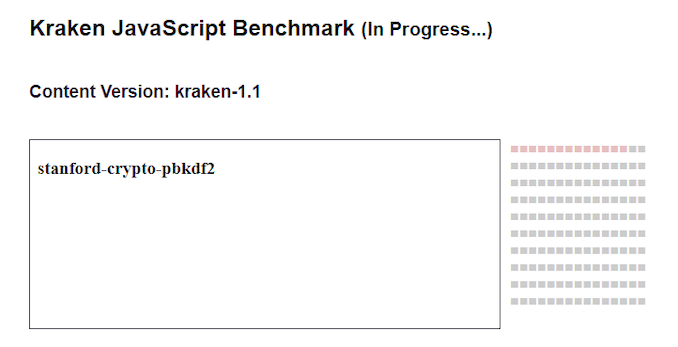
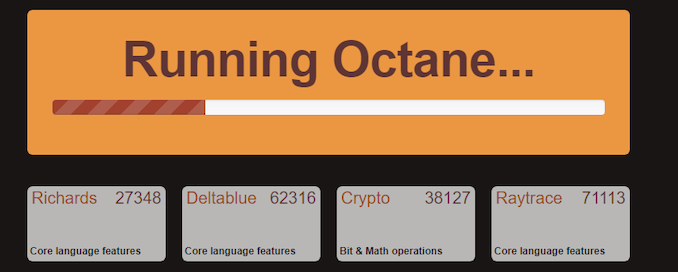
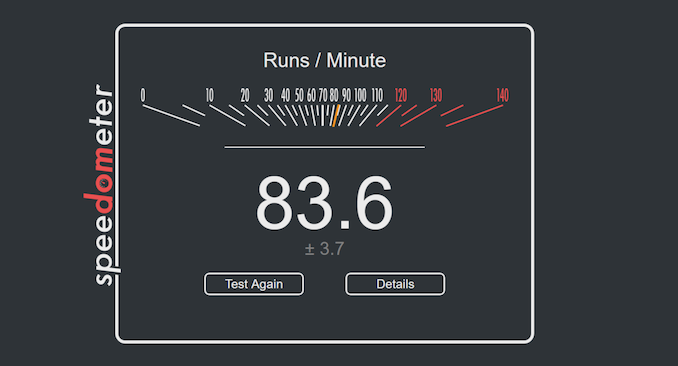








110 Comments
View All Comments
vasily - Monday, July 20, 2020 - link
You might want to check out Phoronix Test Suite and openbenchmarking.org.https://www.phoronix-test-suite.com/
https://openbenchmarking.org/
colinisation - Monday, July 20, 2020 - link
would love to see the following processors added5775C (overclocked to 4Ghz) - just purely to see what impact the eDRAM has on workloads
4770K
7600K
Phenom II X4
Highest Bulldozer core
VIA's highest performance x86 core
faizoff - Monday, July 20, 2020 - link
What a gargantuan project this is going to be. And I cannot wait, oddly enough I've been using the bench tool the past few weeks to get a sense of how much difference an upgrade for me would make.I am probably one of the many (or few) people that have still held on to their i5 2500k and this is one of the places I can select that CPU and compare the benchmarks with newer releases.
This project looks to be an amazing read once all done and will be especially looking forward to those segments "how well does x CPU run today?"
Alim345 - Monday, July 20, 2020 - link
Are you going to make benchmark scripts available? They should be useful for individual comparisons, since many users might have overclocked CPUs which were more common in 2010-2015.brantron - Monday, July 20, 2020 - link
Just to fill out the starting set:7700K needs a common AMD counterpart, i.e. Ryzen 2600
Sandy or Ivy Bridge i7
Haswell i7
That would also make for a good article, as it should be possible to overclock any of those to ~4.5 GHz for a more apples to apples comparison.
StormyParis - Monday, July 20, 2020 - link
Thank you for that. My main question is not "what should I buy" because that's always very well covered, and on a fixed budget there's never much choice anyway, but "should I upgrade *now* which is only worth it when last time's amount of money gets you at least 2x performance. I'ive got a 7yo Core i5... I'll look into it !eastcoast_pete - Monday, July 20, 2020 - link
Ian, thanks for this!One aspect I've wondered about for a while is whether you could include performance/Watt in your tests and comparisons going forward? I know that's usually done for server CPUs, but I also find it of interest for desktop and laptop CPUs.
thebigteam - Monday, July 20, 2020 - link
I think I have the below list of Intel CPUs available if needed, likely with working mobos too. Would be very happy to clean out the closet and get these to you guys :) Likely some 2009/2010 Athlons as wellE8400
i3 530
i3 540
i5 760
i5 2500
i5 4670K
inighthawki - Monday, July 20, 2020 - link
Thank you so much for changing your gaming benchmark methodology. I tend to play my games at 1440p on lowest settings for maximum framerates, which is far more often than not CPU bound. It was always so annoying seeing the benchmarks be GPU bound when I'm trying to see how much a new CPU helps.Smell This - Monday, July 20, 2020 - link
Chicken(lol)
With AM3, AM2+ and AM2 processors, AM3+ processors broke backwards-compatibility.
A mobo like the MSI 790FX K9A2 Platinum transitioned nearly 250 processors from S754-939, to AM2-AM3, beginning with the single-core Athlon 64 3000+ 'Orleans' up to the PhII x6 DDR3 Thubans.
These were the progeny of the K8 or 'Hammer' projects. A Real Man would never leave them behind ...
https://www.cpu-upgrade.com/mb-MSI/K9A2_Platinum_%...